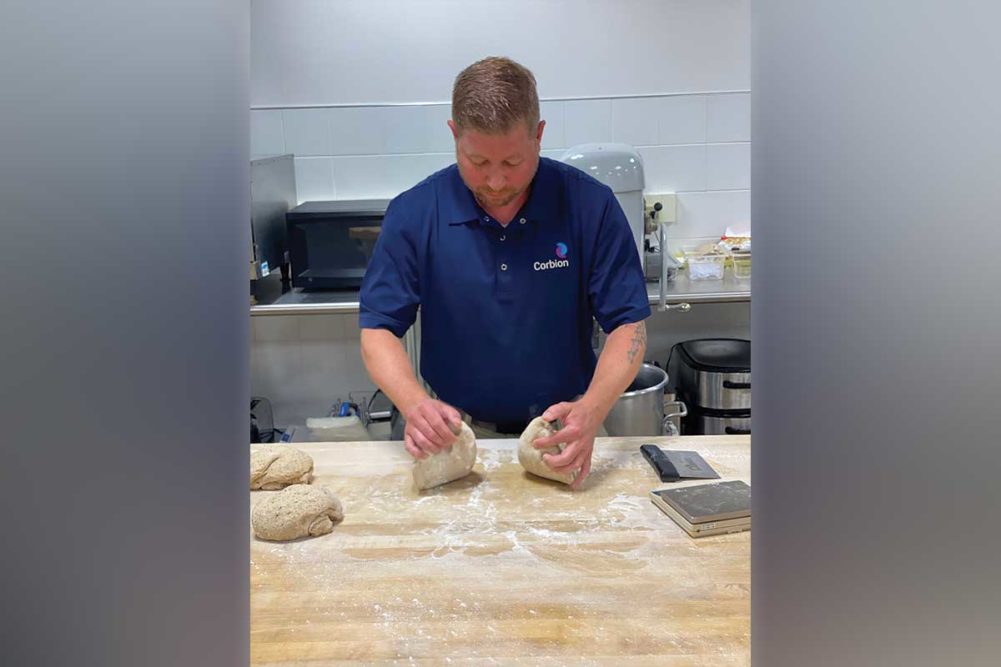The masters never stop learning. Maybe that’s why Steve Barnhart has been fascinated by food since he was a teenager. This fascination realized itself in 2007 when he earned certification from the Retail Bakers Association as a Master Baker. Mr. Barnhart’s educational journey didn’t end there. It continues every day, and that’s how he likes it.
He studied culinary arts at Kendall College and took several baking and pastry classes as part of the curriculum. The science of baking appealed to him, and ever since, baking was his focus. Mr. Barnhart said he had teachers who helped him understand the “why” behind the baking process, which made all the difference. He then took various jobs in retail bakeries, with a muffin and cookie manufacturer and a wholesale bread bakery, before joining the Corbion team where he now serves as senior technical service representative.
In this role, Mr. Barnhart works with Corbion’s R&D team to develop customized solutions for customers. He said the two-way learning that happens with R&D is something he appreciates.
“We all learn from helping each other,” he said. “Understanding the entire baking process from my coworkers’ points of view has let me share in the incredible insights they’ve gained in their career experiences, and that is often more valuable than anything taught in a class.”
While he broadens his knowledge daily, Mr. Barnhart has also taken on the role of teacher. When working with customers, he gains their trust by teaching them what they can do to improve their products.
“My goal with each bakery visit is to help the customer learn something about their own process they didn’t know before my arrival,” Mr. Barnhart explained.
“I try to help the customer understand what the ingredients are doing so they can make more informed decisions when my teammates and I are not around.”
- Steve Barnhart, Corbion
But that education process can be challenging. The solutions discovered in R&D labs don’t always immediately translate to full-scale manufacturing. That’s where Mr. Barnhart’s experience shines.
“My work history and time spent on the line help me understand the kind of impact our ingredient solutions can make for customers,” he said. “Often, when we are testing a new ingredient, we need to take into consideration how the customer’s machinery may be different from what’s in our lab. Knowing this ahead of time helps us to get closer to a favorable solution sooner.”
Mr. Barnhart modifies formulas by providing feedback based on field testing. Knowing customers’ processes allows him to ensure that the testing is done in comparable environments. He said it’s very common to see a bakery experience quality issues, especially with sponge-and-dough systems. One customer asked for assistance with bread that was showing signs of blowout and excessive shred. The bakery had already tried several different methods to fix the issue to no avail.
“When I monitored processes in the plant, I found that the sponges were coming out of the mixer at different temperatures, and no one was checking and adjusting temperature as needed to be within the desired range,” he said.
So, after mixing the sponges for a few hours and getting them to come out within the correct temperature range, the bakery began to consistently produce the bread as it should have been.
“It was a simple fix, but it’s often the simple things that get overlooked,” he added.
The same goes for formulating challenges. He said the key is to understand what each ingredient does. It’s important to know that while adding a little bit of something might be good, adding a lot of it isn’t necessarily better.
“Sometimes, we need to remove more than we put in and clean up a customer’s formula, then start adding only what is needed to get the result the customer wants,” Mr. Barnhart said. “I try to help the customer understand what the ingredients are doing so they can make more informed decisions when my teammates and I are not around.”
Mr. Barnhart admires the knowledge he can tap into within the R&D teams. He said he’s learned more about enzymes, ingredients, process modification and general troubleshooting than he knew possible. And he hopes that never ends.
“This industry is ever-changing,” he said. “There is always something new to be discovered, and there are always new ways to find another use for something traditional.”






